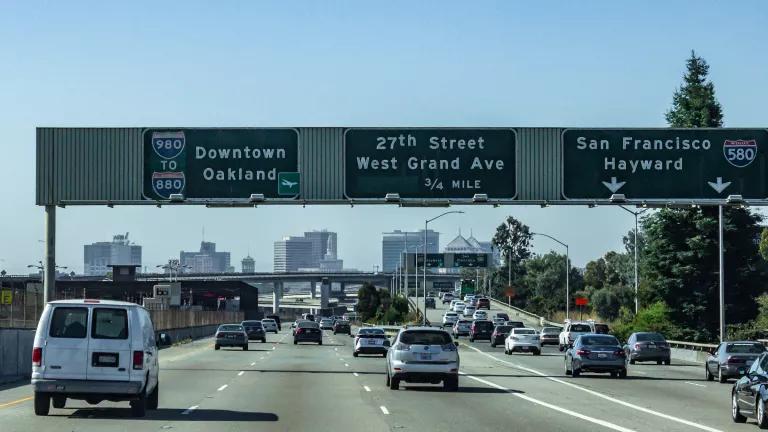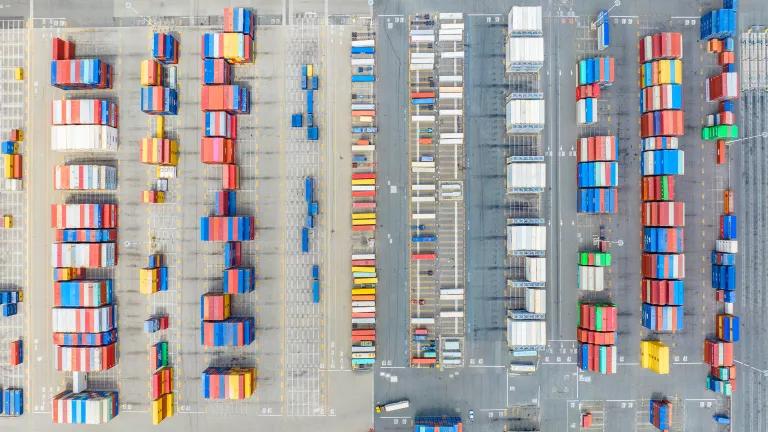California Is Walking—Now Time to Run Toward Reconnecting Communities
New state and federal funding is helping repair harm and reduce pollution in communities divided by roads and highways. California can do even more.

Oakland's I-980 is on a growing list of road and highways projects with legacies of division and displacement in California communities, and which are also are being reimagined with the support of new state and federal funding programs.
The White House and U.S. Department of Transportation jointly announced $3.3 billion in grant awards across the country through the federal “Reconnecting Communities & Neighborhoods” Grant Program, with California applicants receiving $237 million in funds. These funds add to more than $35 million awarded to California projects from the same program last year. California transportation leaders also announced the first funding recipients for California’s “Reconnecting Communities: Highways to Boulevards” Pilot Program yesterday, with three projects in Arcata, South San Francisco, and San Diego identified as awardees.
While all of this funding together (more than $400 million in California) will be impactful, it is nonetheless a drop in the bucket of California's $20+ billion annual transportation infrastructure budget. In order to truly prioritize climate and communities, California leaders must ensure that the full weight of this budget is reconnecting, rather than further dividing and polluting our neighborhoods.
These federal and state investments in repairing past harms are critical to both reducing air pollution and advancing equity in California’s transportation system. Investing in sidewalks, community-led development, and bus-only lanes that connect communities rather than divide them will help us change course from a polluting, congested status quo. This status quo has too-often funded transportation projects that have built or expanded barriers between people and the parks, schools, grocery stores, churches, hospitals, and other amenities that comprise their communities in nearly every major city in California, while directly displacing more than 10,000 Californians (and more than 200,000 people nationally) over the past several decades—with many current projects continuing this toxic pattern.
New state and federal investments reflect important progress—and these are the kinds of investment that NRDC and our partners have asked state leaders to double down on in the state’s budget (with some success), in evaluating specific projects for funding approval, and in legislative reforms to the transportation funding programs that remain most problematic. And the fact that these three investments were chosen from 20 applicants makes clear that there is enormous unmet demand for community-centered transportation investment that advances climate and clean air goals.
With that unmet demand in mind, California must begin shifting from climate and community-centered investment ‘pilot’ projects, to implementation at the scale necessary to reconnect not just a few, but all California communities. As impactful as hundreds of millions of dollars can be, this funding level is small potatoes relative to tens of billions in California's annual transportation budget. By contrast, more than $2 billion alone in planned California transportation spending is still slated to fund projects that expand infrastructure divides in communities and add traffic and pollution to our already-choked streets and roads—meaning for every dollar spent reconnecting communities, California is still spending $10 to further divide them.
To systematically align California’s transportation investments with the state’s climate and equity priorities, we need to leverage the full state transportation budget to support clean mobility choices. This means:
- Growing investment in high-quality public transit and zero-emissions vehicle infrastructure
- Leveraging targeted funding programs (like the Active Transportation Program) and flexible road maintenance programs to invest in sidewalks and ‘complete’ streets that are safe for people of all ages traveling by foot or bicycle
- Minimizing investments in highway boondoggles that further divide and pollute communities.
- Bringing transparency and accountability to transportation spending across the state


.jpg.jpg?h=e309ec10&itok=YMNLEbG7)
